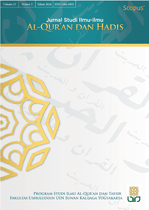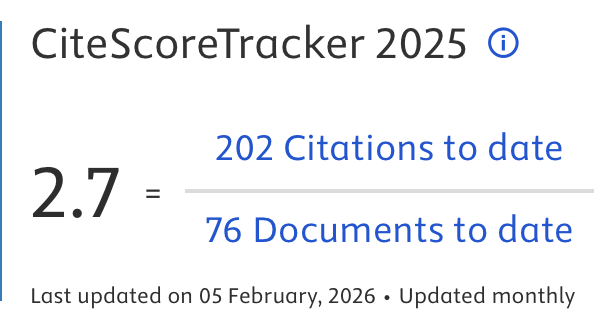Ideological Contestation on the Production of Gender Exegesis within Institutional Quranic Interpretation in Indonesia
DOI:
https://doi.org/10.14421/qh.v25i2.5388Keywords:
Quranic exegesis, Ideological contestation, Power-knowledge relations, Women's leadershipAbstract
The exegetical products concerning women in institutional Quranic interpretations in Indonesia are significantly influenced by ideological contestation, cultural and social structures, and the political authority behind the exegetical writing teams. Consequently, textual comprehension may become biased and not entirely objective. Given this, exploring the ideological aspects underlying the production of religious texts is of paramount importance. This study employs a descriptive-analytical method with Michael Foucault's power relations approach to uncover the ideological dimensions behind exegetical production. Through this approach, the research addresses how societal social structures and state ideologies can influence the production of exegeses regarding women's roles and status in institutional interpretations in Indonesia. The study found that the interpretation of women's leadership in the Thematic Quranic Exegesis of Indonesian Ministry of Religious Affairs of the Republic of Indonesia is not only influenced by factors such as gender, women's characteristics, perceived female inability to address state issues, and the entrenched patriarchal culture in Indonesia, but also by motives of ideological contestation underlying interpretative production. Contextually, this exegesis was produced by the Ministry of Religious Affairs in 2009 during a presidential election contest between male and female candidates. The research concludes that exegetical production in Indonesia is affected by social contexts and power ideologies. The primary contribution of this study lies in tracing the aspects of ideological contestation, societal social structures, and the role of those in power behind the emergence of gender-related exegetical products in Indonesia.
References
Al-Qurthubi, Abu ‘Abdillah Muhammad bin Ahmad alAnshariyyi. Al-Jami’ Li Ahkam Al-Qur’an. Beirut: Dar al-Fikri, 1999.
Albayrak, Ismail, and Hakan Coruh, eds. New Approaches to Qur’anic Hermeneutics in the Muslim World. Special Is. Basel, Switzerland: Religions, 2023.
Amnesti, Muhammad Esa Prasatia. “KARAKTERISTIK PENAFSIRAN AL-QUR’AN DAN TAFSIRNYA KARYA TIM KEMENTERIAN AGAMA REPUBLIK INDONESIA (Characteristics of The Qur’an Interpretation and Their Team Work of The Ministry of Religion of The Republic of Indonesia) Muhammad Esa Prasastia Amnesti” 1, no. 2 (2021).
Ariail Reed, Isaac. “Power: Relational, Discursive, and Performative Dimensions.” Sociological Theory 31, no. 3 (2013): 193–218.
Asnawi, Aqdi Rofiq, Syukron Affani, and Zaenatul Hakamah. “Scientific Qur’anic Exegesis in Indonesia.” Australian Journal of Islamic Studies 6, no. 4 (2021): 25–46.
At-Thabari, Muhammad bin Jarir bin Yazid Abu Ja’far. Jami’ul Bayan Fi Takwilil-Qur’an. Riyadh: Mu’assasah al-Risalah, 2000.
Ayoub Mahmoud. The Qur’an and Its Interpreters. Volume 1. New York: State University of New York Press, 1984.
Crone, Patricia. Islamic Reformism and the Secular State: The Mu’tazila in the Early Abbasid Caliphate. Leiden: Brill Academic Publishers, 2008.
Dzuhayatin, S. R. Rezim Gender Muhammadiyah: Kontestasi Gender, Identitas, Dan Eksistensi. Yogyakarta: Pustaka Pelajar, 2015.
Faizin, Hamam. “Sejarah Dan Karakteristik Al-Qur’an Dan Terjemahnya Kementerian Agama RI.” Suhuf 14, no. 2 (2021): 283–311.
Farouki, Suha Taji. Modern Muslim Intellectuals and the Qur’an. 2nd ed. New York: Oxford University Press, 2006.
Fazlur Rahman. Islam and Modernity: Transformation of an Intellectual Tradition. Chicago: University of Chicago Press, 1982.
Federspiel, H. M. Kajian Al-Qur’an Di Indonesia Dari Mahmud Yunus Hingga Quraish Shihab. Bandung: Mizan, 1996.
Foucault, M. Archaelogy of Knowledge. New York: Routledge Classics, 2002.
———. Discipline and Punish: The Birth of the Prison. England: Penguin Books, 1977.
Foucault, M. Power/Knowledge. Brighton: UK: Harvester Press, 1980.
Gusmian, Islah. Tafsir Al-Quran Dan Kekuasaan Di Indonesia. Yogyakarta: Yayasan Salwa, 2021.
Handayani, Christina Siwi. Subyek Yang Dikekang. Jakarta: Komunitas Salihara, 2013.
Helmiati, H. “The Development of Quranic Exegesis In Indonesia: A General Typology.” Asia-Pacific Journal on Religion and Society 2, no. 1 (2018): 29–38.
Ichwan, Moch Nur. “Negara, Kitab Suci Dan Politik: Terjemah Resmi Al-Qur’an Di Indonesia.” In SADUR: Sejarah Terjemahan Di Indonesia Dan Malaysia, edited by Henri Chambert Loir, 417–433. Jakarta: Kepustakaan Populer Gramedia, 2009.
Idrus, I Aidar, A Anurlia, and S Fadiyah. “Analysis of the Impact of Patriarchal Culture on the Role of Women in Politics and Governance.” JSIP: Jurnal Studi Ilmu Pemerintahan 04, no. 1 (2023): 2023.
Jawad, H. A. The Rights of Women in Islam: An Authentic Approach. New York: ST. Martin’s Press, INC, 1998.
Labibah, Umniyatul, Imam Taufiq, and Yasir Alimi. “Living Qur’an of Pesantren Women: A Manifestation of Surat An-Nisa 34 in A Woman Leadership Role of Nyai Munjidah Wahab.” Jurnal Studi Ilmu-ilmu al-Qur’an dan Hadis 23, no. 1 (2022): 89–110.
Lukman, Fadhli. “Conflicting Interests in the Creation of a State-Authorised Translation: Comparing the Saudi and Indonesian Editions of Al-Qur’an Dan Terjemahnya.” Journal of Qur’anic Studies 26, no. 1 (2024): 38–62.
———. The Official Indonesian Qur’ān Translation: The History and Politics of Al-Qur’an Dan Terjemahnya. The Official Indonesian Qur’ān Translation: The History and Politics of Al-Qur’an Dan Terjemahnya, 2022.
M. A. Muqtedar Khan. “Islam as Identity: After a Century of Islamic Revivalism.” In Islam and Good Governance: A Political Philosophy of Ihsan, 43–76. Newark, USA: SpringerLink, 2019.
McMahan, Amanda, Sarah Vines, and Keenan Jones. “Equitable Access to Health: Integrating Reproductive Rights, Physical Activity, and Dress Freedom.” Journal of Health Equity 1, no. 2 (2018): 25–38.
Mudhoffir, Abdil Mughis. “Teori Kekuasaan Michel Foucault: Tantangan Bagi Sosiologi Politik.” MASYARAKAT: Jurnal Sosiologi 18, no. 1 (2013): 117–133.
Muhammad Ahmad Ibrahim AlJahsh. “Influence Of Cultural Context On Qur’ānic Translation: Analyzing Social Justice Interpretations In Sura An-Nisā’ Verse 58.” Maʿālim al-Qurʾān wa al-Sunnah 19, no. 2 (2023).
Mulia, S. M. Muslimah Reformis: Perempuan Pembaru Keagamaan. Bandung: Mizan, 2005.
Mursyid, Achmad Yafik. “KEBIJAKAN POLITIK DALAM TAFSIR NEGARA : STUDI ATAS AYAT-AYAT FIQIH DALAM TAFSIR.” Al-Bayan: Jurnal Studi Ilmu Al-Qur’an dan Tafsir 6, no. 2 (2021): 117–128.
Neo, Jaclyn L. “Dimensions of Religious Harmony as Constitutional Practice: Beyond State Control.” In German Law Journal, 20:966–985, 2019.
Pink, Johanna. Tradition and Ideology in Contemporary Sunnite Qur’ānic Exegesis: Qur’ānic Commentaries from the Arab World, Turkey and Indonesia and Their Interpretation of Q 5:51. Welt Des Islams. Vol. 50, 2010.
RI, Departemen Agama. Al-Qur’an Dan Tafsirnya. Jakarta: Widya Cahaya, 2011.
Rodin, Dede, Rosihon Anwar, Dody S Truna, and Wahyudin Darmalaksana. “The State and the Holy Quran: Politics of the Quran Translation By the Ministry of Religious Affairs.” Ilmu Ushuluddin 8, no. 1 (2021): 57–80.
Rohmaniyah, I. Konstruksi Patriarki Dalam Tafsir Agama: Sebuah Jalan Panjang. Yogyakarta: Diandra Pustaka Indonesia, 2014.
Rosalind P. Petchesky. “Gender Equality and Reproductive Health: The Role of Social Movements.” Reproductive Health Matters 13, no. 25 (2005): 13–22.
Rozi, Masykur. “Memetakan Skala Prioritas Kebijakan Penanganan Pandemi Covid-19 Perspektif Maqāṣid al-Syarī’ah: Analisis terhadap Peraturan Perundang-Undangan di Indonesia.” Journal of Islamic Law 2, no. 1 (February 9, 2021): 62–93.
Sakina, Ade Irma, and Dessy Hasanah Siti A. “Menyoroti Budaya Patriarki Di Indonesia.” Share : Social Work Journal 7, no. 1 (2017): 71.
Sarah Combellick-Bidney. “Reproductive Rights as Human Rights: Stories from Advocates in Brazil, India and South Africa.” The International Journal of Human Rights 21, no. 7 (2017): 800–822.
Sari, Meri Enita Puspita. “PERAN PEMERINTAH DALAM PENYEDIAAN AKSES PELAYANAN PUBLIK” 2, no. 1 (2018): 1–12.
Subhan, Z. Tafsir Kebencian: Studi Bias Gender Dalam Tafsir Al-Qur’an. Yogyakarta: LKiS, 1999.
Sulaiman, Badri Hasan. “Questioning the Contitutionality of Amandement Aceh’s Autonomy Law by Central Government: Who Has the Authority?” Jurnal Ilmiah Peuradeun 11, no. 2 (May 30, 2023): 591–614.
Syamsuddin, Sahiron. Tafsir Studies. Yogyakarta: eLSAQ Press, 2009.
Tim Penyusun. Tafsir Al-Qur’an Tematik : Kedudukan Dan Peran Perempuan. Departemen Agarama RI, 2009.
Wadud, Amina. “Reflections on Islamic Feminist Exegesis of the Qur’an.” Religions 12, no. 7 (2021): 1–11.
Wienclaw, R.A. Gender Roles and Equality. California: Salem Press, 2011.
Downloads
Published
Issue
Section
License
Copyright (c) 2024 Bambang Husni Nugroho, Ahmad Mustaniruddin, Ahmad Taufik

This work is licensed under a Creative Commons Attribution-NonCommercial-NoDerivatives 4.0 International License.
Publishing your paper with Jurnal Studi Ilmu-ilmu al-Qur'an dan Hadis means that the author or authors retain the copyright in the paper. Jurnal Studi Ilmu-ilmu al-Qur'an dan Hadis uses license CC-BY-NC-ND or an equivalent license as the optimal license for the publication, distribution, use, and reuse of scholarly works. This license permits anyone to copy and redistribute the material in any medium or format and must give appropriate credit, provide a link to the license, and indicate if changes were made. If you remix, translate, transform or build upon the material you may use it for private use only and not for distribution. Jurnal Studi Ilmu-ilmu al-Qur'an dan Hadis granted an exclusive non-commercial reuse license by the author(s), but the author(s) are able to put the paper onto a website, distribute it to colleagues, give it to students, use it in your thesis, etc, so long as the use is not directed at a commercial advantage or toward private monetary gain. The author(s) can reuse the figures and tables and other information contained in their paper published by Jurnal Studi Ilmu-ilmu al-Qur'an dan Hadis in future papers or work without having to ask anyone for permission, provided that the figures, tables, or other information that is included in the new paper or work properly references the published paper as the source of the figures, tables or other information, and the new paper or work is not direct at a private monetary gain or commercial advantage.
Jurnal Studi Ilmu-ilmu al-Qur'an dan Hadis journal Open Acces articles are distrubuted under the Creative Commons Attribution-NonCommercial-NoDerivatives 4.0 International (CC BY-NC-ND 4.0). Article can be read, copy and redistribute the material ini any medium or format under the following conditions:
Attribution — You must give appropriate credit, provide a link to the license, and indicate if changes were made. You may do so in any reasonable manner, but not in any way that suggests the licensor endorses you or your use.
NonCommercial — You may not use the material for commercial purposes.
NoDerivatives — If you remix, transform, or build upon the material, you may not distribute the modified material.











